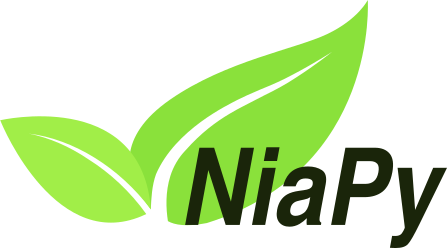# encoding=utf8
import logging
import numpy as np
from niapy.algorithms.algorithm import Algorithm
from niapy.util import levy_flight
logging.basicConfig()
logger = logging.getLogger('niapy.algorithms.basic')
logger.setLevel('INFO')
__all__ = ['CuckooSearch']
[docs]class CuckooSearch(Algorithm):
r"""Implementation of Cuckoo behaviour and levy flights.
Algorithm:
Cuckoo Search
Date:
2018
Authors:
Klemen Berkovič
License:
MIT
Reference:
Yang, Xin-She, and Suash Deb. "Cuckoo search via Lévy flights."
Nature & Biologically Inspired Computing, 2009. NaBIC 2009. World Congress on. IEEE, 2009.
Attributes:
Name (List[str]): list of strings representing algorithm names.
pa (float): Probability of a nest being abandoned.
See Also:
* :class:`niapy.algorithms.Algorithm`
"""
Name = ['CuckooSearch', 'CS']
[docs] @staticmethod
def info():
r"""Get algorithms information.
Returns:
str: Algorithm information.
See Also:
* :func:`niapy.algorithms.Algorithm.info`
"""
return r"""Yang, Xin-She, and Suash Deb. "Cuckoo search via Lévy flights."
Nature & Biologically Inspired Computing, 2009. NaBIC 2009. World Congress on. IEEE, 2009."""
[docs] def __init__(self, population_size=25, pa=0.25, *args, **kwargs):
r"""Initialize CuckooSearch.
Args:
population_size (int): Population size.
pa (float): Probability of a nest being abandoned.
See Also:
* :func:`niapy.algorithms.Algorithm.__init__`
"""
super().__init__(population_size, *args, **kwargs)
self.pa = pa
[docs] def set_parameters(self, population_size=50, pa=0.2, **kwargs):
r"""Set the arguments of an algorithm.
Args:
population_size (int): Population size.
pa (float): Probability of a nest being abandoned.
See Also:
* :func:`niapy.algorithms.Algorithm.set_parameters`
"""
super().set_parameters(population_size=population_size, **kwargs)
self.pa = pa
[docs] def get_parameters(self):
"""Get parameters of the algorithm."""
d = super().get_parameters()
d.update({
'pa': self.pa,
})
return d
[docs] def get_cuckoos(self, population, best_x, task):
step_size = levy_flight(self.rng, size=population.shape) * (population - best_x)
new_population = population + step_size * self.standard_normal(population.shape)
return task.repair(new_population, rng=self.rng)
[docs] def empty_nests(self, population, task):
abandoned = self.random(population.shape) > self.pa
i = self.rng.permutation(self.population_size)
j = self.rng.permutation(self.population_size)
step_size = self.random() * (population[i] - population[j])
return task.repair(population + step_size * abandoned, rng=self.rng)
[docs] def run_iteration(self, task, population, population_fitness, best_x, best_fitness, **params):
r"""Core function of CuckooSearch algorithm.
Args:
task (Task): Optimization task.
population (numpy.ndarray): Current population.
population_fitness (numpy.ndarray): Current populations fitness/function values.
best_x (numpy.ndarray): Global best individual.
best_fitness (float): Global best individual function/fitness values.
**params (Dict[str, Any]): Additional arguments.
Returns:
Tuple[numpy.ndarray, numpy.ndarray, numpy.ndarray, float, Dict[str, Any]]:
1. Initialized population.
2. Initialized populations fitness/function values.
3. New global best solution.
4. New global best solutions fitness/objective value.
5. Additional arguments.
"""
new_nests = self.get_cuckoos(population, best_x, task)
new_fitness = np.apply_along_axis(task.eval, 1, new_nests)
replace = new_fitness < population_fitness
population[replace] = new_nests[replace]
population_fitness[replace] = new_fitness[replace]
best_x, best_fitness = self.get_best(population, population_fitness, best_x, best_fitness)
new_nests = self.empty_nests(population, task)
new_fitness = np.apply_along_axis(task.eval, 1, new_nests)
replace = new_fitness < population_fitness
population[replace] = new_nests[replace]
population_fitness[replace] = new_fitness[replace]
best_x, best_fitness = self.get_best(population, population_fitness, best_x, best_fitness)
return population, population_fitness, best_x, best_fitness, {}
